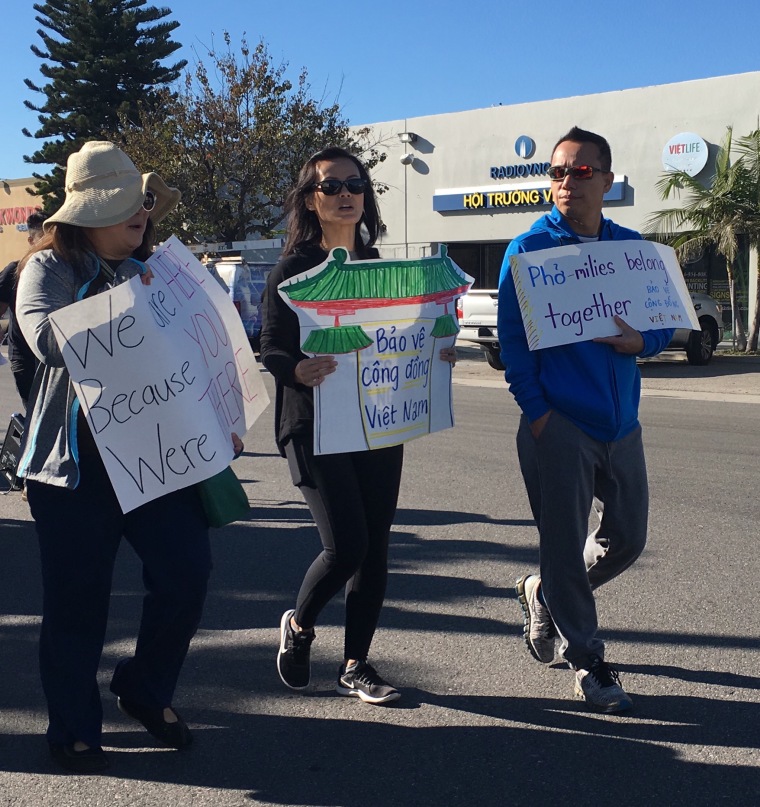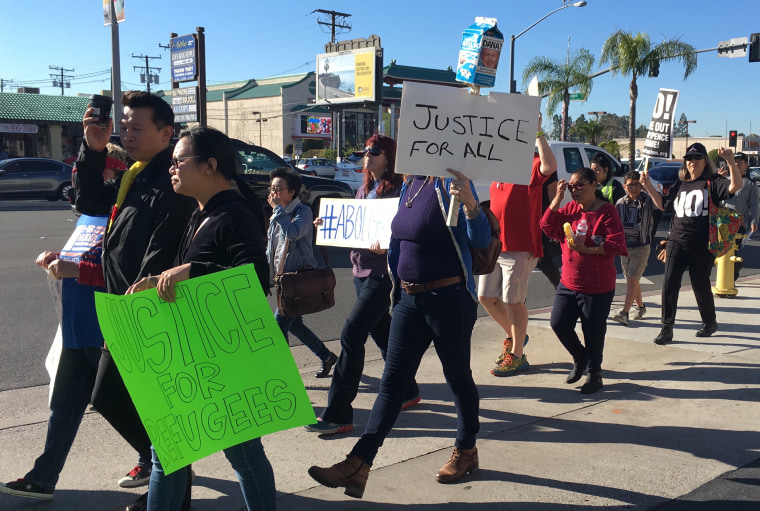On a late Saturday morning in mid-December, dozens of people marched across streets in Westminster, California, demanding the end of detention and deportation of all immigrant communities, particularly Vietnamese immigrants.
Holding signs reading “Protect all refugees” and “Pho-get Trump,” and chanting about stopping family separation, demonstrators rallied in response to reports that the Trump administration was seeking to renegotiate a bilateral agreement that excludes Vietnamese refugees who arrived in the United States before July 12, 1995 — the date the two countries re-established diplomatic relations — from deportation. Many of those who arrived before that date were refugees of the Vietnam War.
The agreement between the U.S. and Vietnam, which was signed on Jan. 22, 2008 and implemented two months later, automatically renews every three years unless either country issues an intent not to renew six months before its expiration date.
But its future is uncertain, ushering in heightened fear in the Vietnamese community, said Nancy Nguyen, executive director of VietLead, a nonprofit that advocates on behalf of the Vietnamese community.

The U.S. State Department and Vietnam's Ministry of Foreign Affairs did not respond to requests for comment on whether any intent has been submitted, though an email from the State Department said that its press office would be operating on a reduced status amid the government shutdown. The Department of Homeland Security last month confirmed in an email that a meeting between the U.S. and Vietnamese governments took place, but declined to provide any details. Advocacy groups have expressed concern that the meeting may have been about the agreement.
Nguyen said that this isn't the first time the Vietnamese community has endured episodes of high alert. Over the past two years, dozens of Vietnamese nationals have been detained, and community groups have learned of pre-1995 immigrants who had been deported.
But this time around, she said, the community is responding proactively by taking action before the agreement's expiration date — which the Southeast Asia Action Resource Center (SEARAC), a civil rights group, interprets is March 22 — rather than reacting after something has happened.
“I think that’s different because in the past for the Vietnamese community, everything has been reactive: ICE moves to detain people and then we react to it," Nguyen said. "We’re finally ready to be pre-emptive and actually put out our own messaging ... with the leadership of the most impacted in our community."
Among those responses was the December rally in California, where advocates urged the administration not to change the agreement between the U.S. and Vietnam, said Tung Nguyen, a community activist at risk of deportation who helped organize the events and is unrelated to Nancy Nguyen. He said he also helped organize rallies in New Orleans, Seattle and Houston, as well as a town hall and vigil in San Jose, California, that took place over the past month.
In addition to these demonstrations, about a dozen organizations across the country are gearing up for a “week of action” slated to run from Jan. 19 to Jan. 27 in 15 cities, Nancy Nguyen said. The goal is to mobilize communities and raise awareness about the possible deportation of Vietnamese nationals and the repatriation agreement through rallies, community forums and other events, she added.
“It's our response to how we as a community feel the repatriation agreement should remain as is, and actually should be expanded to protect more family members,” Nancy Nguyen said.
DHS spokesperson Katie Waldman said in an email last month that there are 7,000 convicted Vietnamese nationals with final orders of removal.
In fiscal year 2018, the U.S. deported 122 Vietnamese nationals, a record over at least the last five fiscal years. Immigration and Customs Enforcement has previously said it does not track the year that individuals with final orders of removal arrived in the United States.
Despite the uncertainty of the future of the 2008 agreement, Katrina Dizon Mariategue, director of national policy at SEARAC, said in an email she has not heard of any advance notice of intent not to renew the agreement from the U.S.
“Due to this, we remain relatively hopeful that the MOU will remain intact,” she said, referring to the memorandum of understanding. “But we cannot predict how the U.S. will choose to apply or interpret it.”
Last month, reports surfaced that the Trump administration unilaterally reinterpreted the agreement. However, Mariategue said that while the U.S. government can claim to do so, it would still need Vietnam's cooperation in issuing travel documents required for removals to happen.
For this reason, community members are being encouraged to remain vigilant and seek legal counsel as needed, she added.
Follow NBC Asian America on Facebook, Twitter, Instagram and Tumblr.



